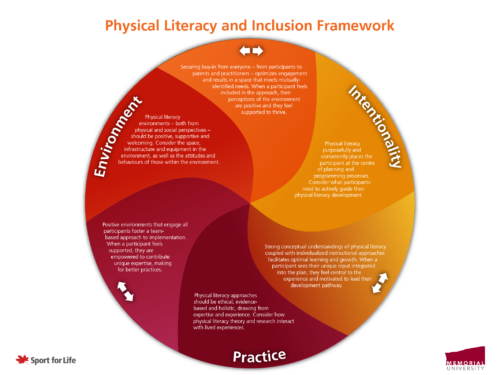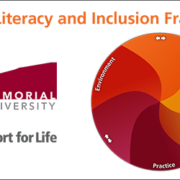Pillars to physical literacy and inclusion: Fostering equality and shared knowledge commitment among stakeholders
Many programs have implemented physical literacy (PL) but often overlook the experiences of persons with diverse abilities due to societal, cultural, and political influences. This can lead to exclusion and marginalization from physical activities. Researchers at Memorial University have addressed this challenge by developing a PL and inclusion framework through direct observation of programming and perspectives from participants of diverse abilities, parents, practitioners, and program administrators. The framework and its three pillars of environment, practice and intentionality offer one lens to support the development of current and future inclusive physical literacy programs.
This blog series will discuss the ten evidence-based best practices for the inclusion of persons with diverse abilities in programming suggested within their research findings. From holistic design to systems of support, and everything in between, find out how to foster inclusion in your programs.

Idealization: Each individual stakeholder is respected as an equal and unique knowledge-holder. All stakeholders must maintain a commitment to shared knowledge and understanding.
By embracing the input and involvement of everyone, from participants to parents and practitioners, we create an inclusive and supportive space that fosters enthusiasm and delivers remarkable results. When each individual’s unique ideas and needs are valued and integrated into the approach, they feel empowered and motivated to thrive.
When participants and stakeholders see their contributions playing a central role in the plan, they also feel encouraged and inspired to take the lead in their personal development pathway.
Putting into practice
Imagine a community fitness program designed to promote long-term physical activity engagement for individuals of all backgrounds and abilities. The program is led by Coach Alex, who strongly emphasizes respecting every participant as an equal and unique knowledge-holder.
Coach Alex understands the importance of diverse perspectives. When planning the fitness program, they involve participants, fitness trainers, healthcare professionals, and community members from various backgrounds. Alex organizes regular meetings and workshops where participants and stakeholders actively contribute their insights and ideas. This collaborative approach ensures that the program reflects the community’s collective knowledge and diverse needs.
Coach Alex creates a culture of peer learning within the program. They recognize that participants often have valuable knowledge and experiences to share. During fitness sessions, participants are encouraged to share their tips, success stories, and challenges with one another. This exchange of knowledge not only fosters a sense of community but enhances everyone’s understanding of the benefits of physical activity.
Coach Alex takes the time to understand each participant’s unique experiences, goals, and physical abilities. They respect that the authentic perspective provided through participants lived experiences is a valuable form of knowledge. Alex conducts one-on-one consultations with participants to learn about their preferences, past experiences, and specific needs or limitations. This individualized approach ensures the program is tailored to each participant’s background and goals.
Coach Alex maintains a commitment to continuous learning. They actively seek opportunities to enhance their knowledge and skills in fitness training and inclusive practices. Alex attends workshops, conferences, and courses on physical activity and inclusivity. They also engage in regular self-reflection, learning from previous experience. Alex shares this knowledge with the participants and stakeholders, ensuring that the program evolves to incorporate the latest practices and research.
The community fitness program becomes a dynamic and supportive environment through Coach Alex’s commitment to respecting each stakeholder as an equal and unique knowledge-holder and fostering a culture of shared knowledge and understanding. Participants not only engage in physical activity for the long term but also feel valued as active contributors to the program’s success.
This example demonstrates how a physical activity practitioner can ensure the principle of respecting each stakeholder as an equal and unique knowledge-holder and promoting a commitment to shared knowledge and understanding to encourage long-term physical activity engagement within a community-based fitness program.
Tangible takeaways
To foster inclusive physical literacy and embody the idealization of treating each stakeholder as an equal and unique knowledge-holder while embracing shared understanding, consider implementing the following recommendations:
- Diverse Representation: Ensure that all stakeholders, regardless of their physical abilities, gender, age, race, or background, have a seat at the table. Create spaces and platforms for open and inclusive dialogue where everyone’s opinions, experiences, and knowledge are valued. Encourage active listening and empathy to understand different perspectives and foster a culture of mutual respect.
- Learning and Skill-Sharing: Organize workshops, training sessions, or events that encourage collaborative learning and skill-sharing. Each individual has unique strengths and expertise, and providing opportunities for stakeholders to teach and learn from one another can foster a deeper appreciation for the diverse knowledge present within the group.
- Celebrating Diversity: Celebrate the achievements and contributions of individuals from various backgrounds, abilities, and cultures. Recognize and appreciate how people may express physical literacy, understanding there’s no one-size-fits-all approach.
- Conflict Resolution and Mediation: Acknowledge disagreements can arise within any group and address them constructively. Encourage open conversations and utilize mediation techniques to resolve conflicts, promoting understanding and compromise. This approach fosters a positive and inclusive environment, allowing everyone to continue contributing to shared knowledge.
By incorporating these recommendations, stakeholders can actively engage in a journey of continuous learning, growth, and collaboration, making the idealization of equal and unique knowledge-holders committed to shared knowledge and understanding a reality within the framework of inclusive physical literacy.
This article is one of a series of posts on the Sport for Life website based on the research conducted by Drs. Kyle Pushkarenko and Jeff Crane of Memorial University. Keep an eye on our blog for information on the ten suggested best practices and ways to take action around them over the coming months.

